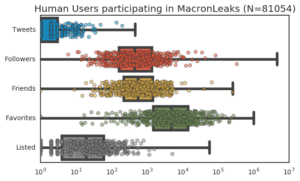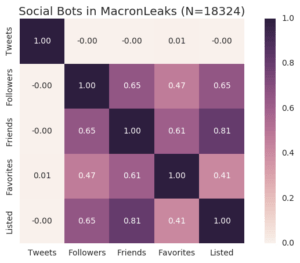My latest work titled “Disinformation and social bot operations in the run up to the 2017 French presidential election” investigates the #MacronLeaks disinformation campaign that occurred in the run up to the 2017 French presidential election.
 Using a large dataset containing nearly 17 million tweets posted by users in the period between the end of April, and May 7, 2017 (Election Day), I first isolated the campaign that was carried out to allegedly reveal frauds and other illicit activities related to moderate candidate Emmanuel Macron, and in support of far-right candidate Marine Le Pen.
Using a large dataset containing nearly 17 million tweets posted by users in the period between the end of April, and May 7, 2017 (Election Day), I first isolated the campaign that was carried out to allegedly reveal frauds and other illicit activities related to moderate candidate Emmanuel Macron, and in support of far-right candidate Marine Le Pen.
New yet simple machine learning techniques devised specifically to analyze the millions of users appearing in this dataset revealed a large social bot operation and pointed to nearly 18 thousand bots deployed to push #MacronLeaks and related topics. The campaign attracted significant attention on the eve of Election Day, engaging overall nearly 100 thousand users in the time span of a few days.
The analysis revealed important new insights about social bot operations and disinformation campaigns on online social media:
- Many bot accounts that supported alt-right narrative in the context of #MacronLeaks were originally created shortly prior to the 2016 U.S. presidential election and used to support the same views in the context of American politics. The accounts went dark after November 8, 2016, only to re-emerge at the beginning of May 2017 to push #MacronLeaks, attack Macron, and support the far-right candidate Marine Le Pen. This corroborates a recent hypothesis about the existence of black markets for reusable political botnets.

- The audience engaged with #MacronLeaks was mainly English-speaking American userbase, rather than French users. Their prior interests prominently feature support for Trump and Republican views, as well as more extreme, alt-right narratives. This suggests a possible explanation for the scarce success of the disinformation campaign: French users, those more likely to vote in support of Macron, were not mobilized nor significantly engaged in discussing these document leaks.
The paper, titled “Disinformation and Social Bot Operations in the Run Up to the 2017 French Presidential Election”, was published on August 7, 2017 in the peer-reviewed journal First Monday.
Cite as:
Emilio Ferrara. Disinformation and Social Bot Operations in the Run Up to the 2017 French Presidential Election. First Monday, 22(8), 2017
Coverage
- One in five bots sharing fake news during France’s presidential election were also involved in the United States’ – ZME Science
- Black-market bots, duped humans are responsible for derailing elections with fake news – ThinkProgress
- Study: Bots have turned Twitter into a powerful political disinformation platform – Venture Beat
- Fake news bots are so economical, you can use them over and over – Harvard NiemanLab
- Pro-Trump Twitter bots were also used to target Macron, research shows – The Verge
- There’s a Bit of Overlap Between Bots Trying to Manipulate American and French Elections – New York Magazine
- Research links pro-Trump, anti-Macron Twitter bots – The Hill
- The Same Twitter Bots That Helped Trump Tried to Sink Macron, Researcher Says – VICE
Press in non-English media
- El uso de ‘bots’ en las elecciones de Francia, por Donald Trump – Sipse (in Spanish)
- Ugyanazok a Twitter robotok kampányoltak Trumpnak és Le Pennek – 444 (in Ukranian)
- Pendant la présidentielle, les robots pro-Trump ont joué les anti-Macron sur Twitter – Mashable (in French)
- Présidentielle française : les robots pro-Trump ont joué les anti-Macron sur Twitter – France 24 (in French)
- Les 18.000 bots qui ont favorisé la diffusion des MacronLeaks – Slate (in French)
- Macron Leaks : Les bots pro-Trump utilisés dans la campagne de désinformation – Le Monde (in French)
